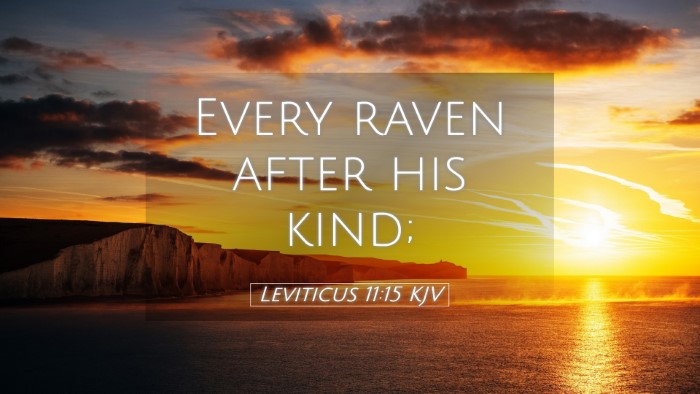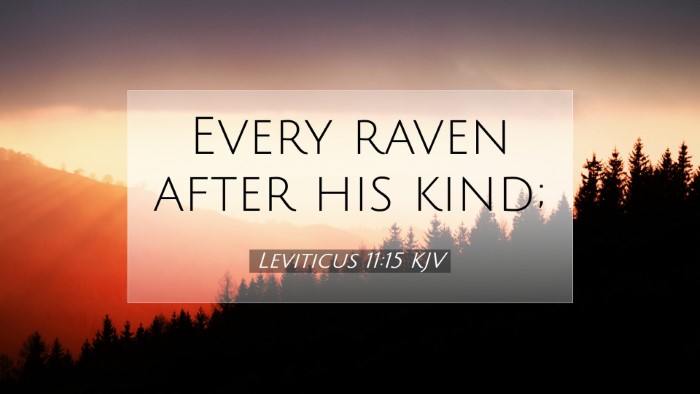Commentary on Leviticus 11:15
Verse: "Every raven after his kind." (Leviticus 11:15)
Introduction
The verse Leviticus 11:15 forms part of the dietary laws instituted by God for the Israelites, which delineate clean and unclean animals. This has considerable theological implications regarding purity, holiness, and separation from pagan practices.
General Interpretation
This verse identifies the raven as an unclean bird, prohibited for consumption by the Israelite community. It reflects broader themes within the Book of Leviticus concerning holiness and the distinctions made by God that govern the life of His people. The raven not only serves as an unclean animal but also symbolizes deeper spiritual truths.
Insights from Public Domain Commentaries
Matthew Henry
Matthew Henry emphasizes the importance of understanding the distinctions made in the Levitical laws. He explains that unclean animals, including the raven, are often associated with death and decay, representing a spiritual corruption. This speaks to the necessity of spiritual cleanliness and the avoidance of anything that leads one away from holiness. Henry suggests that the raven's nature, scavenging for carrion, symbolizes the sinful tendencies within human nature that God seeks to purify.
Albert Barnes
Albert Barnes provides a detailed analysis of the raven within the context of the Jerusalem Temple practices. He views the dietary restrictions as not merely arbitrary, but as divine ordinances meant for the welfare of Israel’s spiritual life. Barnes notes that the raven represents disorder and chaos, contrasting with the ordered life God desires for His people. Moreover, the raven's mention suggests a dual lesson: to observe God's will and acknowledge that some things may appear beneficial but are spiritually harmful.
Adam Clarke
Adam Clarke expands upon the immediate implications of the raven's classification as unclean. He surmises that this designation serves as a warning against engaging with the corrupt influences surrounding Israel. Clarke indicates that the raven's nature—being a scavenger—draws attention to the path of sin and the temptations that can lead believers astray. He argues for a careful reflection on the nature of the animals that God considers clean and unclean as a metaphor for the state of one’s heart and the purity required for communion with God.
Theological Implications
The classification of the raven and other unclean animals in Leviticus offers profound insights for modern believers:
- Sign of Purity: The concept of 'cleanliness' extends beyond dietary laws; it signifies the broader call to spiritual purity in the life of a believer.
- Eschewing Impurity: Understanding what it means to nurture pure thoughts and lifestyles reflecting God's holiness.
- Principle of Distinction: God’s commandments serve as a clear distinction between the holy and the profane, challenging contemporary attitudes towards sin.
Practical Application
For pastors and leaders today, Leviticus 11:15 calls for a firm understanding of the spiritual significance underlying outward practices. It serves as a reminder to encourage congregational life that prioritizes purity in thought, action, and worship. The nature of the raven compels introspection on what feeds our spiritual lives, urging the faithful to avoid practices or habits that lead them away from holiness.
Conclusion
Leviticus 11:15, while seemingly simple in its proclamation of dietary restrictions, resonates with a deeper calling to holiness. The insights drawn from esteemed commentators reveal the necessity of separating oneself from spiritual decay. In today’s context, this means adhering to God’s guidelines for living a life marked by purity, integrity, and a close relationship with the divine.


